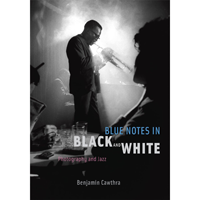Blue Notes in Black and White – Photography and Jazz
Product details
Publisher- University of Chicago Press; Illustrated edition
Language- English
Hardcover- 392 pages
ISBN-10- 0226098753
ISBN-13- 978-0226098753
Dimensions- 25.65 x 18.8 x 2.79 cm
About The Book
Miles Davis, supremely cool behind his shades. Billie Holiday, eyes closed and head tilted back in full cry. John Coltrane, one hand behind his neck and a finger held pensively to his lips. These iconic images have captivated jazz fans nearly as much as the music has.
Jazz photographs are visual landmarks in American history, acting as both a reflection and a vital part of African American culture in a time of immense upheaval, conflict, and celebration.
Charting the development of jazz photography from the swing era of the 1930s to the rise of black nationalism in the '60s, "Blue Notes in Black and White" is the first of its kind- a fascinating account of the partnership between two of the twentieth century's most innovative art forms. Benjamin Cawthra introduces us to the great jazz photographers - including Gjon Mili, William Gottlieb, Herman Leonard, Francis Wolff, Roy DeCarava, and William Claxton - and their struggles, hustles, styles, and creative visions.
We also meet their legendary subjects, such as Duke Ellington, sweating through a late-night jam session for the troops during World War II, and Dizzy Gillespie, stylish in beret, glasses, and goatee. Cawthra shows us the connections among the photographers, art directors, editors, and record producers who crafted a look for jazz that would sell magazines and albums.
And on the other side of the lens, he explores how the musicians shaped their public images to further their own financial and political goals.
This mixture of art, commerce, and racial politics resulted in a rich visual legacy that is vividly on display in "Blue Notes in Black and White".
Beyond illuminating the aesthetic power of these images, Cawthra ultimately shows how jazz and its imagery served a crucial function in the struggle for civil rights, making African Americans proudly, powerfully visible.




 New
New
 New
New